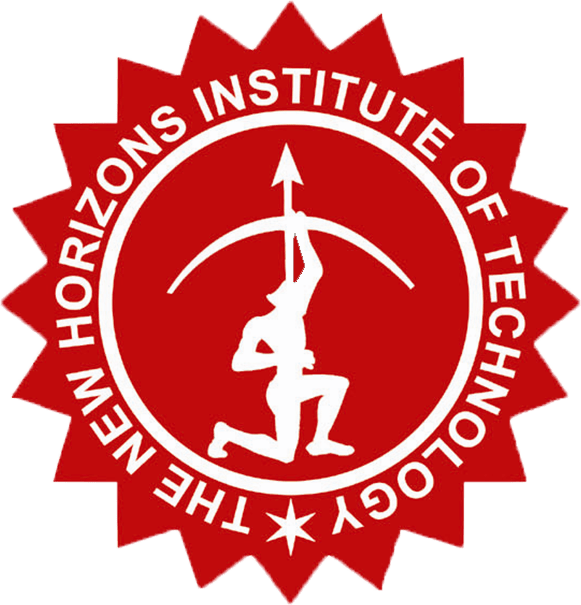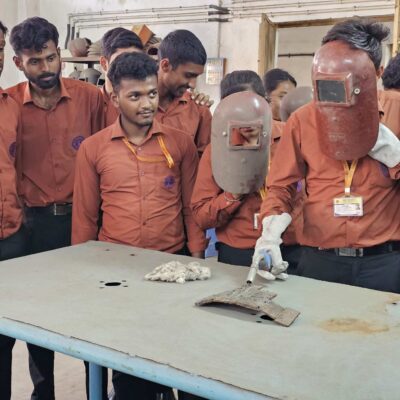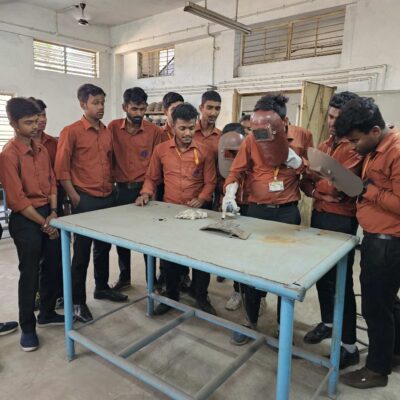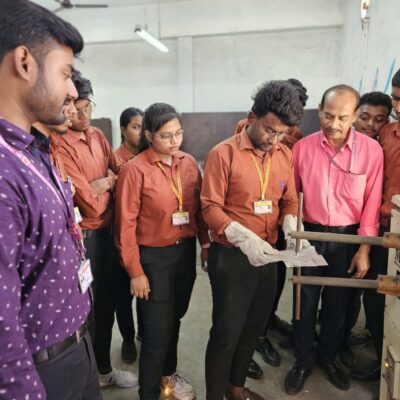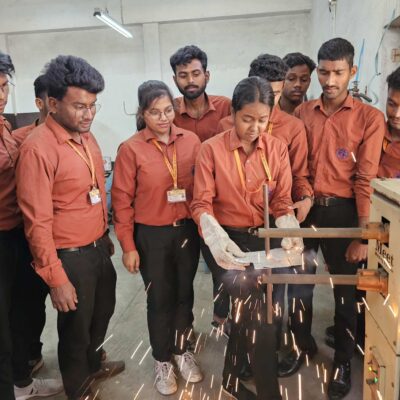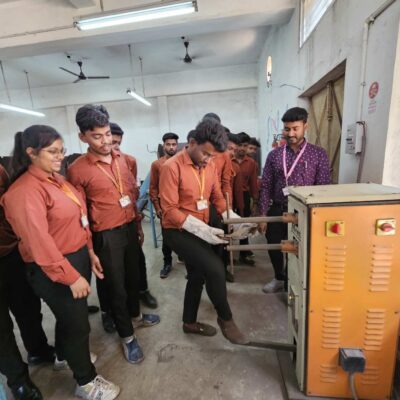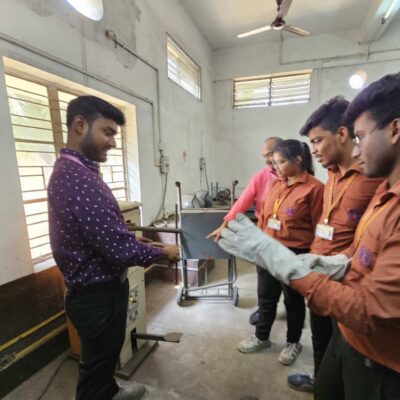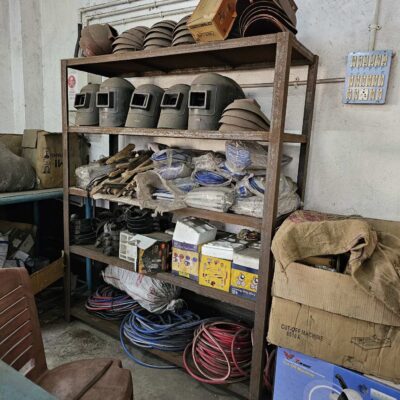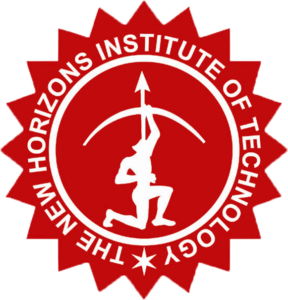The candidates, who are looking forward to pursuing the course of ITI welder must make sure that they are eligible enough as per the specified criteria. One can find the criterion of eligibility below:-
ITI Welder
Course Summary
The ITI Welder course in India is a comprehensive vocational training program approved by the National Council for Vocational Training (NCVT). This program typically spans one to two years and is designed to provide students with the essential skills and knowledge needed for a career in welding.
Key aspects of the ITI Welder course include:
- Welding Techniques: Training in various welding methods such as gas welding, arc welding, TIG (Tungsten Inert Gas) welding, and MIG (Metal Inert Gas) welding.
- Theoretical Knowledge: Understanding the principles of welding technology, including material properties, welding symbols, and design specifications.
- Practical Training: Hands-on experience with welding equipment and tools, enabling students to weld different materials like steel and aluminum.
- Safety Practices: Emphasis on safety protocols and measures to prevent accidents and ensure a safe working environment.
Upon completion of the course, graduates are well-prepared for employment in various industries such as construction, manufacturing, shipbuilding, and automotive. The ITI Welder course aims to produce skilled welders who can meet industry standards and contribute to the country's industrial development. Career opportunities for graduates include positions as welders, welding inspectors, and supervisors, with potential for both domestic and international employment.
Documents Required
Syllabus
The ITI Welder syllabus is designed to provide students with comprehensive training in welding techniques, safety protocols, theoretical knowledge, and practical skills. Below is a detailed overview of the typical syllabus for the ITI Welder course:
First Year
Professional Knowledge
- Introduction to Welding:
- Basics of welding, types of welding processes, and their applications.
- History and development of welding.
- Safety Precautions:
- Workshop safety practices.
- Safe handling of welding equipment.
- Fire prevention and first aid measures.
- Gas Welding:
- Principles of oxy-acetylene welding.
- Gas welding equipment and techniques.
- Flame settings and gas cutting.
- Arc Welding:
- Fundamentals of electric arc welding.
- Types and functions of arc welding machines.
- Selection and use of electrodes.
- Welding Joints and Positions:
- Types of welding joints (butt, lap, corner, edge, and T-joints).
- Welding positions (flat, horizontal, vertical, overhead).
- Metallurgy:
- Basic concepts of metallurgy.
- Properties of metals and alloys used in welding.
Professional Skills
- Gas Welding Practices:
- Setting up gas welding equipment.
- Performing gas welding and cutting operations.
- Arc Welding Practices:
- Setting up arc welding equipment.
- Performing straight beads and joint welds.
- Basic Fabrication:
- Simple fabrication tasks using gas and arc welding techniques.
- Welding Symbols:
- Understanding and interpreting welding symbols and blueprints.
Second Year
Professional Knowledge
- Advanced Welding Techniques:
- TIG (Tungsten Inert Gas) welding.
- MIG (Metal Inert Gas) welding.
- Plasma cutting.
- Welding Defects and Inspection:
- Common welding defects and their causes.
- Methods for inspecting and testing welds.
- Advanced Metallurgy:
- Heat treatment processes.
- Stress relief and effects of welding on metal properties.
- Welding Codes and Standards:
- National and international welding standards.
- Codes and certifications relevant to the welding industry.
Professional Skills
- TIG Welding Practices:
- Setting up TIG welding equipment.
- Performing TIG welding on various materials.
- MIG Welding Practices:
- Setting up MIG welding equipment.
- Performing MIG welding on different materials.
- Advanced Fabrication:
- Fabricating complex structures and components using advanced welding techniques.
- Welding Inspection and Testing:
- Conducting visual inspections.
- Non-destructive testing (NDT) methods such as ultrasonic, radiographic, and dye penetrant testing.
Workshop Calculation and Science
- Mathematics:
- Basic arithmetic, algebra, geometry, and trigonometry relevant to welding tasks.
- Physics:
- Concepts of heat, light, electricity, and magnetism as they relate to welding.
- Engineering Drawing:
- Technical drawing and reading blueprints.
- Understanding welding diagrams and symbols.
Employability Skills
- Communication Skills:
- Verbal and written communication.
- Technical English for welders.
- Basic IT Skills:
- Computer basics and internet usage.
- Software applications related to welding.
- Entrepreneurship:
- Basics of starting and managing a business.
- Financial literacy for small businesses.
- Environmental Education:
- Understanding environmental impacts of welding.
- Waste management and sustainable practices in welding.
This syllabus ensures that students acquire a balanced mix of theoretical knowledge and practical skills, preparing them for a successful career in welding.
Infrastructure
Career Options and Job Prospects
Graduates of the ITI Welder course have a wide range of job prospects due to the high demand for skilled welders in various industries. Here is a detailed overview of the job prospects for ITI Welder graduates:
Industries and Sectors
- Manufacturing: Welders are essential in manufacturing plants for creating and assembling metal products. This includes sectors like automotive, aerospace, shipbuilding, and heavy machinery.
- Construction: Welders play a critical role in constructing buildings, bridges, pipelines, and other infrastructure projects.
- Oil and Gas: The oil and gas industry requires skilled welders for pipeline construction, maintenance, and repair.
- Automotive: Automotive manufacturing and repair facilities employ welders for vehicle assembly, customization, and repairs.
- Shipbuilding and Repair: Shipyards and marine repair facilities need welders for constructing and maintaining ships and other marine structures.
- Railways: Welders are employed in the construction and maintenance of railway tracks, coaches, and other railway infrastructure.
Job Roles
- Welder: Perform various welding tasks using different welding techniques such as MIG, TIG, and arc welding.
- Welding Inspector: Inspect welded joints and structures to ensure they meet quality and safety standards.
- Fabricator: Assemble metal structures and components based on blueprints and technical drawings.
- Maintenance Technician: Perform maintenance and repairs on existing welding systems and equipment.
- Pipe Welder: Specialize in welding pipelines used in industries such as oil and gas, water supply, and sewage systems.
- Structural Welder: Focus on welding structural components used in construction projects.
- Welding Supervisor: Oversee welding operations, manage teams of welders, and ensure adherence to safety standards and project specifications.
- Robotic Welding Technician: Operate and maintain robotic welding systems in automated manufacturing environments.
Career Growth and Opportunities
- Advancement: With experience, welders can advance to supervisory roles, become welding inspectors, or specialize in high-demand areas such as underwater welding or robotic welding.
- Entrepreneurship: Skilled welders can start their own welding businesses, providing services to various industries and gaining financial independence.
- Further Education and Certification: Pursuing advanced certifications and courses can open up opportunities for higher-paying positions and specialized roles.
- International Opportunities: Skilled welders are in demand worldwide, offering opportunities to work abroad in countries with significant industrial and construction activities.
Earnings and Benefits
- Competitive Salary: Welders typically earn competitive wages, with the potential for overtime pay and bonuses in high-demand sectors.
- Job Stability: Due to the essential nature of welding in many industries, job stability and consistent demand for skilled welders are common.
- Benefits: Many employers offer benefits such as health insurance, retirement plans, and paid time off.
Industry Trends
- Technological Advancements: Emerging technologies like automated and robotic welding are creating new opportunities for welders skilled in these areas.
- Sustainability and Green Energy: The growing focus on renewable energy and sustainable practices is increasing demand for welders in sectors such as wind and solar energy.
- Infrastructure Development: Government initiatives and investments in infrastructure development are driving demand for welders in construction and related industries.
In summary, ITI Welder graduates have numerous job prospects across various industries, with opportunities for career growth, competitive salaries, and the potential for international employment. The diverse skill set acquired through the ITI Welder course ensures that graduates are well-prepared to meet the demands of the job market.
